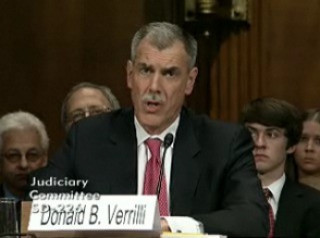Health Care Case: Covering Uninsured Secures 'Blessings Of Liberty,' Says Obama Attorney

WASHINGTON -- In a closing statement following three days of intense constitutional debate over the health care law, the Obama administration's chief Supreme Court attorney appealed to justices' compassion by talking about balancing liberty with protecting 40 million uninsured Americans.
There is an important connection, a profound connection between that problem and liberty, Solicitor General Donald Verrilli told the nine justices. And I do think it's important that we not lose sight of that.
Verrilli had been beating back arguments seeking to take down the mandate that Americans carry a basic level of health insurance and an expansion of Medicaid, the subject of Wednesday's arguments. He pointed to the millions of Americans with chronic problems like diabetes or heart disease that Medicaid serves.
While opponents of the health care law rage about the liberty they feel has been taken away, Verrilli talked about the liberty denied to the severely sick who are left untreated.
This population of Medicaid-eligible people ... they will be unshackled from the disabilities that those diseases put on them and have the opportunity to enjoy the blessings of liberty, Verrilli said.
While some justices have signaled the health care law is in danger, Verrilli implored them to understand the problem that Congress was attempting to fix.
In a very fundamental way, this Medicaid expansion, as well as the provisions we discussed yesterday, secure of the blessings of liberty, Verrilli said.
Congress struggled with the issue of how to deal with this profound problem of 40 million people without health care for many years, and it made a judgment, Verrilli said, mentioning the experts who helped lawmakers tackle the complex problem. Maybe they were right, maybe they weren't, but this is something about which the people of the United States can deliberate and they can vote, and if they think it needs to be changed, they can change it.
FULL TEXT OF CLOSING ARGUMENT:
But if I may just say in conclusion that I would like to take half a step back here, that this provision, the Medicaid expansion that we are talking about this afternoon, and the provisions we have talked about yesterday, we have been talking about them in terms of their effect as measures that solve problems, problems in the economic marketplace, that have resulted in millions of people not having health care because they can't afford insurance.
There is an important connection, a profound connection between that problem and liberty. And I do think it's important that we not lose sight of that. That in this population of Medicaid eligible people who will receive health care that they cannot now afford under this Medicaid expansion, there will be millions of people with chronic conditions like diabetes and heart disease, and as a result of the health care that they will get, they will be unshackled from the disabilities that those diseases put on them and have the opportunity to enjoy the blessings of liberty.
And the same thing will be true for - for a husband whose wife is diagnosed with breast cancer and who won't face the prospect of being forced into bankruptcy to try to get care for his wife and face the risk of having to raise his children alone and I can multiply example after example after example.
In a very fundamental way this Medicaid expansion, as well as the provisions we discussed yesterday, secure of the blessings of liberty. And I think that that is important as the Court's considering these issues that that be kept in mind. The - the Congress struggled with the issue of how to deal with this profound problem of 40 million people without health care for many years, and it made a judgment, and its judgment is one that is, I think, in conformity with lots of experts thought, was the best complex of options to handle this problem.
Maybe they were right, maybe they weren't, but this is something about which the people of the United States can deliberate and they can vote, and if they think it needs to be changed, they can change it. And I would suggest to the Court with profound respect for the Court's obligation to ensure that the Federal Government remains a government of enumerated powers, that this is not a case in any of its aspects that calls that into question. That this was a judgment of policy, that democratically accountable branches of this government made by their best lights, and I would encourage this Court to respect that judgment and ask that the Affordable Care Act, in its entirety, be upheld. Thank you.
© Copyright IBTimes 2024. All rights reserved.





















